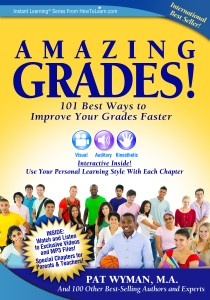Archive for the ‘Learning Difficulties’ Category
 “Low-cost learning coach is golden.” – Doc Meek
“Low-cost learning coach is golden.” – Doc Meek
Image from: 123rf.com
A LOW-COST READING BUDDY IS GOLDEN
Harold (not his real name) was brought into the learning clinic by his frustrated father, a single parent. “All I want to know,” said he, “is how it is possible for my boy to be in Grade 5 and still not reading properly?”
So began a somewhat tense discussion between the father and myself, a Neurological Learning Specialist at THE LEARNING CLINIC WORLDWIDE.
Different Brains Learn Different Ways
“Different brains learn in different ways,” I said to the father. “Some brains learn in very unusual ways, and the school system cannot keep up with all the variations, so they tend to teach in a few standard ways and many of the pupils learn to read using those few regular ways, and the rest tend to suffer.”
“So can you help my boy learn to read properly?” asked the father anxiously. “Most likely,” I said.
Harold attended the learning clinic for several Saturdays in a row, about an hour each Saturday. I asked the father to bring in tests of hearing and eyesight for Harold and they were normal.
Specialized Reading Strategies
I taught Harold various visualization strategies (drawing a quick rough outline of an object, such as a dog for example, and writing DOG right on the dog, not under it as a caption).
Then I said to the father, “We need Harold to be working with someone every single day for 10-15 minutes with various active learning strategies. An hour on Saturday with me won’t do the job. For one thing it’s too expensive and Harold will not make the needed progress unless he practices learning strategies daily.”
A Low-cost Learning Coach
I asked the father to find an inexpensive daily learning coach. “The lady next door? A Grade 11 student who could work with Harold every noon hour at school?”
“The learning coach does not need to have any professional credentials,” I emphasized.
“The only requirement for the learning coach is that they like Harold. ”
“And that Harold likes them. That’s it. ”
“I’ll teach the learning coach what to do, what simple learning strategies to practice each day with Harold, and you can bring Harold and his learning coach in to see me occasionally on Saturdays so we can see how things are going, OK?”
The father kept bringing Harold in every Saturday and said, “I can’t find anybody handy to work with Harold.”
“You’re wasting your money if you don’t get a daily learning coach to help,” I said, “and more to the point, Harold will not be making the progress he needs to make to be successful in school without a few minutes practice every day with the learning coach.”
An Older Student for a Learning Coach (“Reading Buddy”)
Finally, the father found a Grade 7 student to help. I was concerned the boys were only two grades apart. I was afraid they would just play around and not do any useful practice with reading.
I kept my concerns to myself.
Because the Grade 7 student was so close to Harold’s age, we decided to call him a “reading buddy” instead of a learning coach.
It was wonderful to watch this reading buddy work gently with Harold in practicing his daily learning strategies.
Now, with his daily practice in place for 15 minutes every noon hour at school, Harold’s reading skills began to soar!
The father was delighted and so was Harold!
Harold’s marks soared at school as well, and his teacher was so pleased.
The Reading Buddy Himself Struggled with Reading
I found out later that the Grade 7 student had reading problems and if I had known that I probably would not have been willing to let him act as Harold’s reading buddy.
It speaks volumes about being non-judgmental doesn’t it? The reading buddy was just far enough ahead of Harold to be of real value to him.
Because Harold’s reading buddy struggled so much with reading himself, he never ridiculed Harold about his struggles with reading.
Who would have guessed that such an unlikely pair would have made such a good reading pair?
The “take-home” lesson?
Low-cost reading buddies are worth their weight in gold!
Doc Meek, Sherwood Park, Alberta, CANADA
 “Why is he fighting all the time?” the mother anguished.
“Why is he fighting all the time?” the mother anguished.

Image from: Photobucket.com
“Why is He Fighting All the Time?”
Blaine (not his real name) was always fighting in the schoolyard at his elementary school.
The school principal phoned his mother to say Blaine would be suspended if the fighting did not stop.
Finally Blaine’s mother brought him in to see a Neurological Learning Specialist at THE LEARNING CLINIC.
“Why is he fighting all the time?” the mother anguished.
“Can you help him to stop fighting?”
“What else is going on?” the specialist asked.
“He has struggled since grade one and gets poor marks,” said the mother.
She went on to say that his biggest problem was that he was now in grade four and still did not know how to read.
The learning specialist asked Blaine what he liked about school.
“Nothing.”
“What are you good at?” “Nothing.”
“What do you like outside of school?”
Blaine brightened and said he loved to ski.
“Are you good at it?”
“Pretty good.”
The mother confirmed that Blaine was, in fact, a top notch skier.
“I can beat my Dad down the hill!” Blaine piped up.

Skier Photo from: 123rf.com
“Hey, way to go!” exclaimed the learning specialist, gently touching the right side of Blaine’s head.
Different Parts of the Brain in Charge of Different Skills
“Hey Blaine, wouldn’t it be great if you could read just like you ski down the mountain, smoothly and easily now?”
The learning specialist then played a game with Blaine, touching the left side of Blaine’s head.
He had Blaine imagine the great skier (in the right side of his head) befriending the not-so-great reader (in the left side of his head).
Then they imagined the skier teaching the reader to read “smooth as a skier going downhill in good snow on a sunny day.” 😮
And so…
As the imaginary great skier (in the right side of Blaine’s brain) taught the imaginary reader (in the left side of his brain), Blaine the boy in Grade 4 at school gradually learned to read “smooth as silk.”
Would it surprise you to learn that as Blaine learned to read well, his fighting stopped?
Doc Meek, Sherwood Park, Alberta, Canada, Friday, January 24, 2014
 Lady Aquamarine Hides Secret Shame – Doc Meek
Lady Aquamarine Hides Secret Shame – Doc Meek

Image from: Photobucket.com
LADY AQUAMARINE HIDES SECRET SHAME
By Dr. J. Collins (“Doc”) Meek
Once upon a time an undersea lady of noble blood pined to become a mortal. Finally, miraculously, her wish was granted. She became mortal and soon joined a women’s precision swim team.
No longer burdened with royal demands and expectations, Lady Aquamarine (now simply known as Andrea) entered upon her human adventure with great gusto. Her undersea swimming talents made for high success on the women’s precision swim team.
Still, mortality was a real challenge in many ways. This created moments in her life that were difficult and joyful, both.
She and her team rose to the top of their rank and were known and lauded far and wide.
Painful Secret
But alas, the Aquamarine Lady had a painful secret. Very painful. Although she was lauded and loved by everyone, she covered her heart in shame within herself. She spoke to no one of her carefully guarded secret…
Life went on.
Image from: Photobucket.com
One day, she was talking with her mother (Lady Amelia of the North Sea) and told her that though she was highly successful as a precision swimmer (of course!), she was failing as a mortal because she could not read. Her mother reminded her that a return to her former undersea life was not possible.
“I Am So Ashamed”
“Why don’t you seek some way to learn to read?” her mother asked innocently. “Impossible!” exclaimed Andrea, thoroughly discouraged. “I’ve tried everything and nothing works. I’ll never be able to learn to read. I am so ashamed!”
“Better seek out the Old Man of the Sea,” her mother intoned and dove back into her accustomed watery domain.
The Old Man of the Sea was elusive.
Hope at Last
So Andrea asked her mortal friend Andilusia, “What can I possibly do?” Andilusia said, “I’ve heard there is a doctor who helps hopeless cases. The mothers love him because he gives them hope for their troubled children.
Andrea sought far and wide for this hopeful doctor. When she finally found him, she pleaded with him to help her learn to read. He asked her, “What is the one thing on earth you love most?”
Andrea immediately related her adventures as a precision team member. “I love the work and I love the team and I love the challenges.”
Then, for seemingly no reason, she blurted out, “But what I love the most is swimming in the aquamarine waters of the South Pacific islands!” She didn’t tell him this was in her former undersea life of course. She was afraid he would not believe her aquatic story.
The good doctor simply said. “Was it the warm waters that you loved?”
Aquamarine Hues Can Speak!
“Yes,” mused Andrea, “And mostly the incredible aquamarine hues!”
“You have no idea of the magnificence of the aquamarine hues,” she said, almost weeping.
“Well, it is obvious then,” said the good doctor, “we need to have those inspiring aquamarine hues teach you now to learn to read.”
“What!?” exclaimed Andrea, not willing to believe the good doctor knew that lovely-hued waters could talk with her as in her former undersea life.
Colored Overlays a Big Surprise
“Here,” said the good doctor, “Look at these gel colored overlays that are used to cover spotlights in the world of dramatic productions, presentations and plays.”
“Oh,” blurted Andrea, “Sometimes they put spotlights on us when our precision swim team is performing, especially in the evenings.”
Andrea immediately sought out one of the technicians who operated the spotlights for the team. He showed her an array of gel colored overlays, and she quickly picked several that were an exact match with the aquamarine waters of her South Seas experiences.
Andrea placed one of the aquamarine gels over the first page in a book she longed to read.
The “Small Black Marks” on the Printed Page Now Made Sense!
And she could not believe her eyes! The normal blur of quaint black marks on the page now shimmered gently in a quiet sea. She noticed that some of the quaint black marks (now softened by one of the aquamarine colored overlays) seemed to speak to her softly, seemed to make more sense to her now.
“My love of precision swimming now gives me a love of reading that I never ever thought I could achieve!” she rejoiced.
She wept for joy.
Defeats Dyslexia
With time, she learned individual words and phrases and loved to make sense of the whole sentence, then the whole paragraph and then the whole story.
And so, thanks to the colored overlays she was now using every day, she went merrily on her way! She got on with her life with great precision and great happiness.
Once thoroughly defeated, Lady Aquamarine now thoroughly defeats dyslexia.
……………………………
J Collins Meek, Ph.D., shows children and adults how to defeat dyslexia, ADHD, and many different kinds of learning problems. He is in private practice in Edmonton, Alberta, CANADA. He is an expert at creating innovative protocols to help children and adults triumph over learning difficulties.
 “Nominate your favorite school for a $3,000 gift.” – Pat Wyman, HowToLearn.com
“Nominate your favorite school for a $3,000 gift.” – Pat Wyman, HowToLearn.com
 Today I am grateful (again) for Pat Wyman’s enduring educational leadership, both in person and in her famous HowToLearn.com website. – Doc Meek, Wed, Sept 25, 2013, Calgary, Alberta, CANADA
Today I am grateful (again) for Pat Wyman’s enduring educational leadership, both in person and in her famous HowToLearn.com website. – Doc Meek, Wed, Sept 25, 2013, Calgary, Alberta, CANADA
Here’s another huge FREE gift announcement from Pat Wyman of HowToLearn.com:
SPECIAL ANNOUNCEMENT:
Enter to win $3,000 in school supplies and the Amazing Grades book for your favorite school
The URL (LINK) for the website for this contest is:
https://www.facebook.com/
Nordic Naturals, the #1 fish oil company in the U.S., is sponsoring the What’s Essential(TM) School Supplies Giveaway September 20 – October 31, 2013.
To enter your favorite elementary, middle, or high school, click here.
Nordic Naturals, a global company based in Watsonville, CA, is committed to giving each generation what it needs to grow healthy and strong. That begins with exceptionally pure and fresh omega oils–essential for optimal health at any age.
Omega-3 fish oils are especially critical for children and students because of the many ways they support brain health.
In Amazing Grades, contributor Dr. Keri Marshall, Chief Medical Officer for Nordic Naturals, writes:
“Recent research suggests that the brain’s frontal lobe, which is associated with impulse control, planning, organization, and decision-making abilities, continues to grow well into a person’s twenties.
“We need all those skills to succeed in life, but especially to succeed in school.”
Dr. Marshall goes on to explain that extensive clinical research shows that the omega-3 essential fatty acids found in fish oil help nourish the brain and offer key benefits in these areas.
“This imbalance in the ratio of omega-3 to omega-6 fats,” Dr. Marshall says in Amazing Grades, “can promote inflammation and may contribute to a variety of health problems, including attention deficit/hyperactivity disorder (ADHD), dyslexia, autism spectrum disorders, and other behavioral and psychological issues.
Attention and Behavior: In a University of South Australia clinical study, 132 children with ADHD between the ages of 7 and 12 who were not on medication were given fish oil capsules. At the end of the study, they were calmer, less impulsive, and showed improvements in attention, behavior, and vocabulary.
Higher Grades and Test Scores: Studies show that just the simple addition of cold-water fish to the diet once a week improves grades and leads to higher scores on intelligence tests.
Learning and Literacy: Improvements in verbal learning and spelling, better information retention, and even taking fewer sick days from school were some of the outcomes noted in a group of children who regularly took omega-3 fish oil supplements. That research was conducted with 355 children between the ages of 7 and 12.
Memory and Problem Solving: During pregnancy, mothers preferentially transfer their own stores of omega-3 to their developing babies. “Researchers have found that children whose mothers consumed enough of these healthy fats while pregnant are more likely to score higher on tests of memory function,” Dr. Marshall writes, “while other evidence suggests that babies who receive formula supplemented with EPA and DHA do better at problem-solving tasks than their peers.”
Lasting Benefits: Research also supports the fact that taking omega-3s has lasting cognitive benefits. Eighteen-year-olds who ate more fish at 15 outperformed their non-fish eating counterparts on tests of combined intelligence, verbal performance, and visiospatial performance.
Dr. Marshall summarizes, in Amazing Grades, “Studies like these demonstrate just how important it is to get omega-3s throughout childhood and adolescence. Yet most people aren’t getting anywhere near what they should. That’s why I and many health care experts recommend supplementing with omega-3s in the form of fish oil (algae oil if you’re vegetarian).”
Dr. Marshall recommends Nordic Naturals award-winning supplements for children because of their exceptional purity and freshness, delivery systems kids enjoy (gummies, chewable soft gels and liquids), and great taste.
To read more of Dr. Marshall’s article, enter your school in the Nordic Naturals What’s Essential School Supplies Giveaway and win a copy of Pat Wyman’s best-selling book Amazing Grades for your school library!
PatPat Wyman
Founder, www.HowToLearn.com (707) 837 8180
Best selling author, Amazing Grades; Spelling Made Easy and more – Amazon Author Page
College Professor for teachers”Be ashamed to die before you have won some victory for humanity.” Horace Mann”There are two ways to live your life; one as if nothing is a miracle, and the other as if everything is a miracle.” Albert Einstein
 “Can emotional intelligence be taught?” – Jennifer Kahn
“Can emotional intelligence be taught?” – Jennifer Kahn
Call (587) 400-4707 right now to set up your FREE initial consultation with Dr. Meek, or click the banner below.

Image from: photobucket.com
………………………………………….
Today I am full of gratitude for people like Jennifer Kahn, who asks, “”If everybody knows that test scores and grades aren’t the keys to success, how do we teach, and measure, the things that are?” – Doc Meek, Wed, Sept 11, 2013, Calgary, Alberta, CANADA
In an article in The New York Times, Education Issue, Sept 11, 2013, Jennifer Kahn outlines programs some schools and some teachers are successfully using to mitigate the damage caused by emotional trauma. It’s not just the emotional damage, it’s the educational damage! Thank you, Jennifer Kahn!
HERE IS THE LINK to Jennifer’s article:
THE EDUCATION ISSUE of The New York Times, September 11, 2013
Can Emotional Intelligence Be Taught?
 “I can read!” – Doc Meek
“I can read!” – Doc Meek
 Image from: Photobucket.com Image from: Photobucket.com |
Today I am full of gratitude that I live in a literacy culture. I am so glad that my mother learned to read as a child. She is 95 years old now and can’t do many things, but she still enjoys reading! Even when she’s confined to her bed. – Doc Meek
In all my years as a learning disability specialist and educational therapist I can easily say that about 95% of the students I’ve seen in my 35+ years of teaching kids with reading problems have had reading fluency problems. Reading fluently describes how a skilled reader reads aloud.
Let me give you an example…I met Jason in March; he was in 4th grade. He had brown straight hair and a great smile, although he didn’t smile very often then. He was floundering; it took what seemed like ‘forever’ to read. He repeated, skipped, and substituted words when he read, too. It was painful to listen to his stilted repetitive reading. His classmates were zooming right past him. His mom Kate was losing sleep over what to do and how to help him. She had already been told by the school that Jason would most likely be held back.
Kate, at a loss for what to do contacted me and told me what was going on. First I reassured her that there was much that she could do as a parent to help Jason. Then we got started.
I knew we needed to work quickly to get his reading level up so that he wouldn’t be held back. One of the keys to Jason’s improvement was reading fluency training which helped him to sound out words more quickly and read accurately without repeating, skipping or substituting words. By the end of his third session of specific fluency activities he had already improved his reading speed and accuracy. Within several days he went from 30 words per minute to 60 words per minute. His confidence soared.
What Causes Reading Fluency Problems
Reading problems are typically due to a combination of learning skills, areas of perception, that aren’t working as well as they could, should, and can. And you can have a reading problem without having dyslexia or a learning disability.
So, what specifically was going on with Jason?
Jason did not have an actual learning disability or dyslexia. What Jason did have was a variety of areas of perception (visual, auditory, and tactile/kinesthetic) that weren’t working as well as they could have been which impacted his ability to read fluently.
The Most Important Activity A Parent Can Do to Boost Reading
| Pat Wyman, The Center for New Discoveries in Learning, Inc., 4535 W. Sahara Ave., Suite 200, Las Vegas, NV 89102Unsubscribe | Change Subscriber Options |





